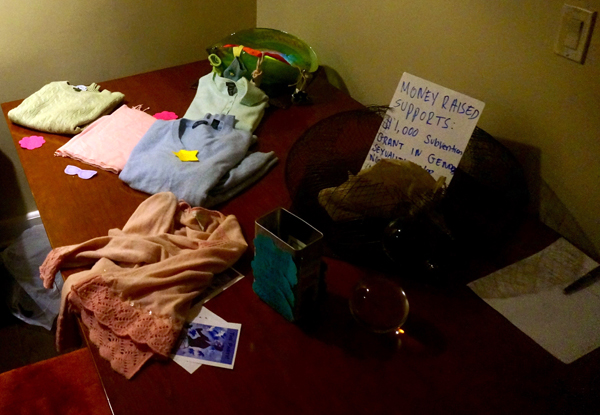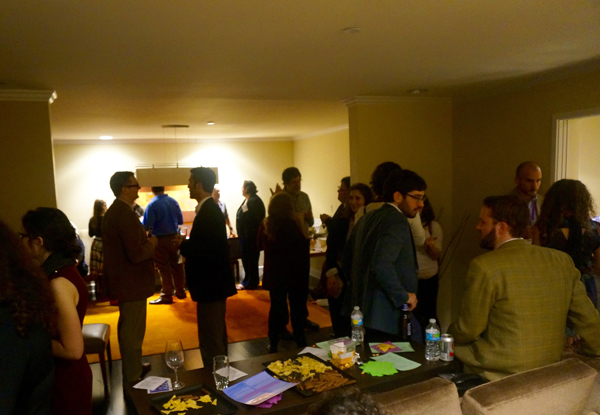About the AJS Gender Justice Caucus
2025 Calls for Awards
2024 AJS Gender Justice Award for Mentorship
2024 Cashmere Subvention Award in Jewish, Gender, and Women’s Studies
Focus on Gender Equity in Publishing and Research
Founded in 1986, the AJS Gender Justice Caucus supports women and all marginalized genders in the profession and advances the study of gender and intersectionality within the Association for Jewish Studies and Jewish Studies. The Caucus welcomes people of all marginalized genders including women, trans people, non-binary people, intersex people, genderqueer people, and gender questioning people, and sexual orientations as members.
The Gender Justice Caucus sponsors sessions on gender, pedagogy, and other professional topics at the annual AJS conference.
We offer a number of competitive grants such as book subventions, paper prizes, a mentoring program for emerging woman scholars, and travel grants for graduate students.
The Caucus also publishes gender-inclusive and women's studies syllabi in Jewish Studies.
The Gender Justice Caucus holds an annual conference breakfast-time meeting, usually on Monday morning of the conference. Here, graduate students, independent scholars, contingent scholars, and junior and senior scholars meet, network, and share recently published work in gender as well as information on relevant conferences and fellowships.
Established at a time when feminist concerns and scholarship on gender were marginalized within the field of Jewish Studies, the Gender Justice Caucus has brought these issues to greater prominence within the Association for Jewish Studies and the larger scholarly community.
Cochairs: Jenny Caplan and Jennifer Thompson
For more information, email the Gender Justice Caucus at genderjusticecaucus@associationforjewishstudies.org.
The deadline to apply has passed.
The AJS Gender Justice Caucus announces a grant of $1,000 to support scholarly publication in the area of Jewish, Gender, Sexuality, and Women’s Studies. Book proposals to be considered for the grant must make a clear argument for the ways in which the work represents a contribution to any of these fields and a subfield of Jewish Studies. The grant is open to scholars at all stages of their careers. While a contract for publication is not required at the time of application, funds can only be disbursed once a contract with a publisher is executed. In the hope that the subvention grant might help a scholar to secure a contract, the expectation is that the contract will be in hand within 12 months of receiving the award.
For questions about the Subvention Award, please contact Laura Levitt at llevitt@temple.edu
For questions about the application apparatus, contact Amy Weiss at aweiss@associationforjewishstudies.org
Application Deadline: April 30, 2025
The deadline to apply has passed.
What is the next step for Jewish feminist and gender studies? In what ways can recent theoretical trends in feminist, gender, queer, and trans-theory impact the various disciplines within Jewish studies? In recognition of the importance of these questions, the AJS Gender Justice Caucus invites submissions for its Prize for Innovative Scholarship in Gender and Jewish Studies. The prize will be given in recognition of a paper presented at the last AJS annual meeting within any discipline of Jewish Studies that opens up new areas of inquiry or advances Jewish feminist or gender studies. The prize carries a cash award of $500. To be considered, papers must have been prepared especially for presentation at the last AJS annual meeting held in December 2024.
Application Deadline: March 21, 2025
Elisheva Carlebach
Read the nomination letter.
Previous winners include:
2023: Laura Leibman
2022: Marion Kaplan
2021: Deborah Dash Moore and Anita Norich
2020: Judith Baskin and Sarah Horowitz
2019: Laura Levitt
2018: Marsha Rosenblitt and Fran Malino
This year, we chose three very different feminist gender/women's studies projects to which to award the Cashmere Prize.
1) Lori Harrison-Kahan’s West of the Ghetto: Pioneering Women Writers and Jewish American Literary Culture is a work that uncovers a neglected archive of Jewish women writers based in San Francisco in the late 19th/early 20th centuries. The figures she explores, through a blend of literary and cultural analysis and contextualization as well as biographical sketches, include Emma Wolf, Bettie Lowenberg, Harriet Lane Levy, Miriam Michelson, and Anna Strunsky. Harrison-Kahan’s book follows important recovery work she has already done as editor and co-editor of recent new editions of texts by Emma Wolf and Miriam Michelson, among others. Her fascinating, well-researched, and meticulously structured project not only brings to light works by Jewish women authors who have, until now, remained largely obscured; but it also pries open broader questions about how canons are established and reinforced, and what it means to challenge dominant cultural and literary historiographies. This intervention begins to rebalance the East-Coast, specifically New York City-centric, shaping of the American Jewish literary canon, toward a more West Coast, specifically San Francisco-based understanding of this canon. It is, perhaps, no accident that the contours of canonicity are reshaped not only geographically, but in parallel terms of who have authoritative voices to tell American Jewish stories, women or men.
2) Delivering Knowledge: Jewish Midwives and Hidden Healing in Early Modern Europe is historian Jordan Katz’s compelling intervention into studies of early modern Jewish society, offering a revised, more inclusive way of thinking about communal Jewish life at the time by centering gender, health, and healthcare. Through prose that remain accessible even as it preserves the complexity of her subjects, Katz narrows in on the vital roles that women—specifically midwives—played in shaping various facets of communal and individual Jewish life. Centering the voices of midwives, and building on a diverse archive, from midwives’ records and rabbinical texts to civic and medical records, Delivering Knowledge sheds light on previously concealed interactions and connections between and among diverse communities of Jews and Christians, and midwives and other healthcare authorities. Katz makes the further compelling and important argument that these midwives (and their records) helped to transform, and to give us a better understanding of, the Administrative State in early modern Europe.
3) Cara Rock-Singer’s Gestating Judaism: The Corporeal Technologies of American Jewish Religion provocatively—and skillfully—places bodies at the center of a feminist ethnographic analysis of Jewish reproductive technologies. This theoretically and methodologically pioneering project enacts an approach Singer terms “low Talmud” (after Stuart Hall’s “low theory”), which is to say, a practice of, in turns, laying out, synthesizing, and analyzing a diverse and far-reaching archive, mixing biblical and rabbinic literature alongside ethnographic and autoethnographic field notes. Through her innovative performative ethnographical analysis and practice, Rock-Singer’s comprehensive and multifaceted project ultimately challenges well-worn boundaries, between the secular and the religious, the body and the mind, centering marginalized bodies and stories in order to expose alternate, generative, and often exuberant ways of knowing modern and contemporary Judaisms.
To help draw attention to this issue, we are sharing a number of online pieces, including a series published by Feminist Studies in Religion on “manels,” “manthologies,” and the failure to include women scholars in academic ventures. Many of these pieces have been written by women in Jewish Studies.
See the series by Michal Raucher for Feminist Studies in Religion:
Mara Benjamin “On the Uses of Academic Privilege (@theTable 'Manthologies)"
Feminist Studies in Religion 27
May, 2019
Michal Raucher “Even the Allies Are Misogynist (@theTable: 'Manthologies')”
Feminist Studies in Religion May 28,
2019
Alison Joseph “It’s Not that Easy: On the Challenges Facing an Editor”
Feminist Studies in Religion May
29, 2019
Sarah Imhoff “404 Women Not Found Error"
Feminist Studies in Religion May 30, 2019
Kecia Ali “No Manthology Is an Island”
Feminist Studies in Religion June 4, 2019
Susanna Heschel “Women in Jewish Studies: Conversations from the Periphery”
Feminist Studies in Religion May
31, 2019
and also:
Robert Cargill “The Gender Divide”
Biblical Archeology Society May
24, 2019

